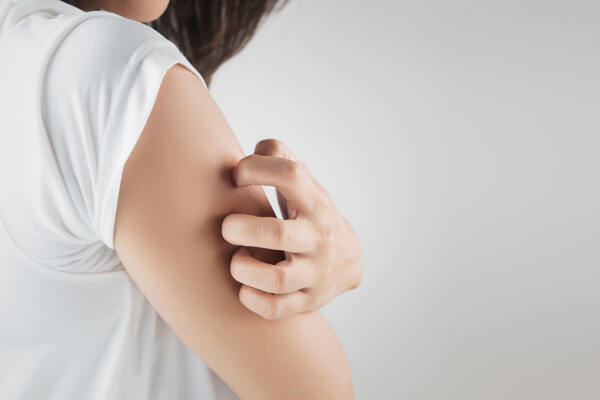Your Survival Guide for Eczema in the Wintertime
No matter the season, dealing with eczema is just no fun. But it’s really no fun in the wintertime. You’re building a snowman, walking in the park, or just working at your desk when suddenly you look down and notice your hands are cracked and bleeding. Yikes! When did that happen?
It probably happened around the first day of winter: when the sun started hibernating and the air started drying out.
Eczema can be discouraging, but with a little planning (and a little help) you’ll survive and thrive during the colder months!
How can you tell if you have eczema?
Eczema is a skin condition that commonly affects the hands, face, feet, wrists, and backs of the knees – though it can appear in other places as well. It tends to manifest as red, scaly, itchy skin that flares up from time to time.
Even if you don’t have eczema, it’s important to protect your skin during the wintertime. If you do have eczema, though, it’s especially crucial.
Most eczema patients experience intense itching. Your skin may itch so much that you scratch until it bleeds. The skin can be red, inflamed, bumpy, swollen, or scaly. Commonly, the skin feels very dry, almost like sandpaper. It may be extremely sensitive, reacting negatively to certain soaps or materials.
Eczema looks different for everyone, so we recommend seeing a dermatologist to find out if you really have it or not. If you do, it’s best to know so you can get treatment.
Your dermatologist will probably prescribe certain moisturizers or creams to soothe your skin. They may also prescribe oral medications for you to take as a supplement, like antihistamine or steroids. Since eczema can make your skin extremely sensitive, your dermatologist might recommend avoiding certain soaps or fabrics.
Why does eczema flare up in the winter?
You’ve probably noticed your skin feeling drier after you’ve been out in the cold. So you may be surprised to learn that it’s not actually the cold that dries out your skin. It’s the lack of humidity.
In the wintertime, there’s less humidity in the air, which means less natural moisture for your skin. There’s also some evidence that sunlight is good for eczema, and of course there’s less of that in the wintertime.
Another factor is your heater. Now, we know you love your heater in the wintertime, but just hear us out!
When you come inside from the cold and turn your heater up all the way, you’re moving straight from a chilly environment to a warm environment. While the abrupt climate change isn’t great for your skin, the dry air you’re blasting through your house is even worse. That dry heat can soak the moisture out of your skin and make your eczema flare up all over again.
Also, some eczema patients are more sensitive to certain fabrics – and a prime culprit is wool. That rough, scratchy fabric can irritate your sensitive skin. If you’re wearing a lot of wool or synthetic fabrics in the wintertime, these could be contributing to your eczema problems.
So with everything against you, how are you supposed to survive the winter?
Don’t despair! Even with the frigid weather and your treacherous heating system against you, you can still protect your skin and enjoy the season of snow and hot chocolate.
How to manage your eczema in the wintertime:
From drinking water to buying a humidifier, there are all sorts of things you can do to soothe your sensitive skin during bouts of cold weather. Here are some tips:
- Drink, drink, drink (water)
While sources differ on how much water you should drink a day, eight glasses is a pretty good place to start. (And feel free to down some cocoa and hot cider while you’re at it.)
- Humidify
We’re not going to tell you to shut off your heater. Maybe just use a humidifier to cancel out that dry air.
- Protect your hands
So here’s the thing: you want to protect your hands when you go out in the cold, but those scratchy woolen mittens make your skin itch like crazy. It may take some trial and error before you find gloves that keep your hands warm out in the elements but don’t irritate your eczema in the process. When all else fails, wear silk gloves underneath the woolen ones, or just thrust your hands deep into your pockets and hope for the best.
- Dress for success
When you have to deal with eczema in unwieldy places like your neck, back, or arms, looking good in that wool jumper simply isn’t worth it. Wool and synthetic fabrics are the main ones to avoid, but you might also find that polyester, leather, and even denim irritate your skin. Try lighter, breezier fabrics like cotton (100% is safest), fine linen, and silk.
- Let the sunshine in
There’s some evidence that taking Vitamin D and using light therapy can help combat the effects of dark, dry weather on your skin. If you’re curious, it’s a good idea to talk to a dermatologist to learn whether or not light therapy and Vitamin D supplements can soothe your eczema.
More survival tips for eczema
No matter what time of year it is, there are certain things you can do to protect your skin and soothe your eczema. Here are a few helpful pointers:
- You are what you eat
Eating certain foods can irritate or soothe your eczema. While specific triggers vary from person to person, eating a diet full of lean protein, healthy fats, and plenty of fresh fruits and vegetables is usually effective. On the other hand, foods that contain preservatives or artificial ingredients can trigger an eczema flare-up. That means you might want to stay away from processed and fast food.
- Not every lotion is your friend
A lot of eczema patients try lotions and topical creams for their skin, only to find they sting and don’t help much.
That’s why it’s best to get a professional opinion from a dermatologist.
Most of the time, ointments are your best bet, since they’re high in oil content. Look for ointments made from mineral oil and petroleum jelly. Watch out for products made with preservatives like butylparaben and methylparaben. Instead, opt for natural preservatives like grapefruit seed extract or neem oil. Shoot for products that are fragrance and dye-free.
- Wear gloves when you do dishes
If you wash a lot of dishes and have eczema on your hands, invest in some quality rubber gloves. Not only will the soap irritate your skin if you don’t wear gloves, the hot water will dry you out.
- Choose your soap wisely
On that note, some soaps are definitely not your friend. You’ll want to avoid soaps and body washes that contain alcohol, glycolic acid, sulfate, and petroleum. Again, steer clear of fragrances: they may smell nice, but they’re not nice on your skin. Natural, high-quality bar soaps are usually a good option.
Spring is just around the corner, so bundle up in your cotton jumper, slather on some prescription moisturizer, and grab life by the horns! (with gloves on, of course.)

